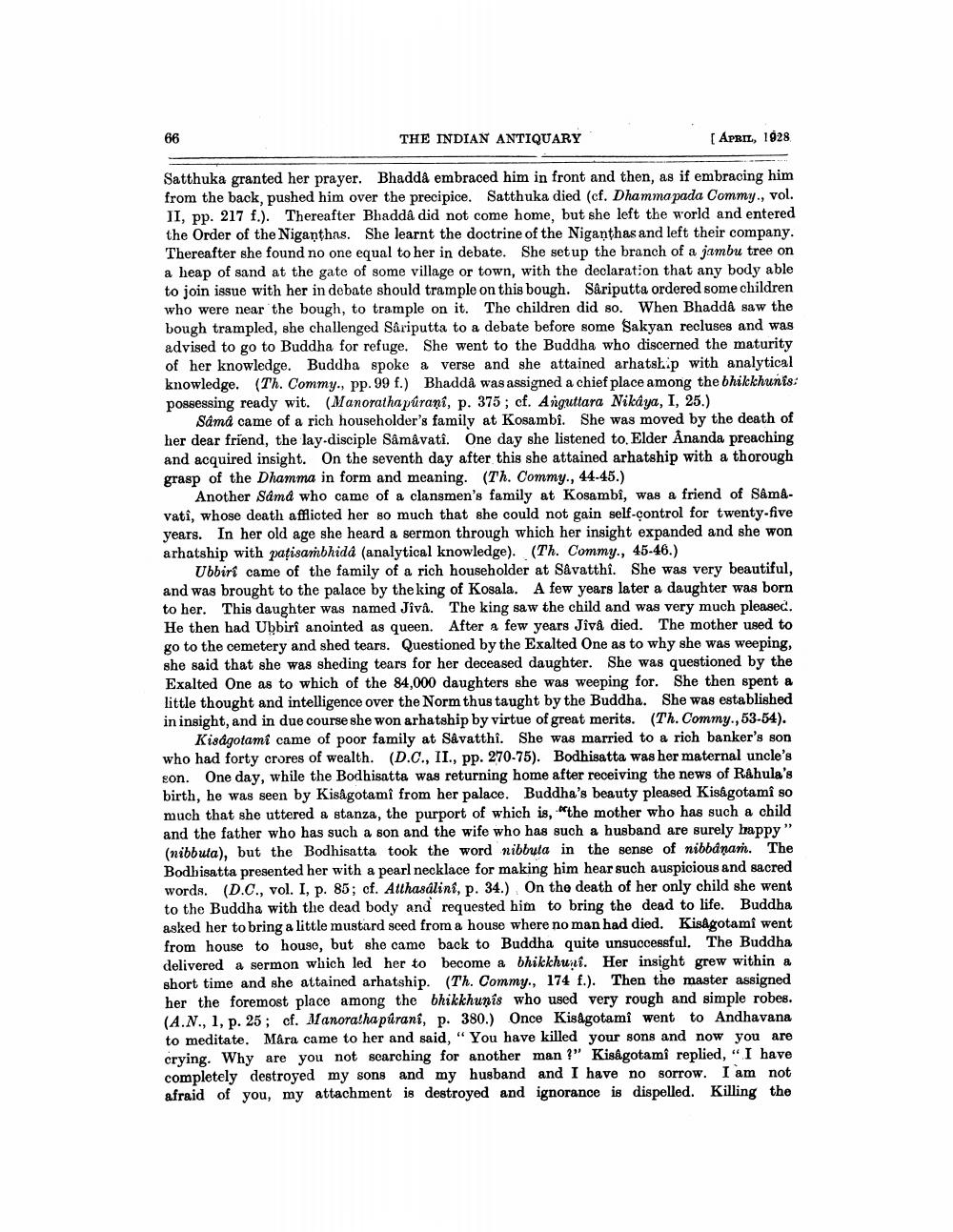________________
THE INDIAN ANTIQUARY
APRIL, 1928
Satthuka granted her prayer. Bhadd& embraced him in front and then, as if embracing him from the back, pushed him over the precipice. Satthuka died (cf. Dhammapada Commy., vol. II, pp. 217 f.). Thereafter Bhadda did not come home, but she left the world and entered the Order of the Niganthas. She learnt the doctrine of the Niganthas and left their company. Thereafter she found no one equal to her in debate. She set up the branch of a jambu tree on a heap of sand at the gate of some village or town, with the declaration that any body able to join issue with her in debate should trample on this bough. Sariputta ordered some children who were near the bough, to trample on it. The children did so. When Bhaddå saw the bough trampled, she challenged Säriputta to a debate before some Sakyan recluses and was advised to go to Buddha for refuge. She went to the Buddha who discerned the maturity of her knowledge. Buddha spoke a verse and she attained arhatskip with analytical knowledge. (Th. Commy., pp. 99 f.) Bhadda was assigned a chief place among the bhikkhunis: possessing ready wit. (Manorathapurani, p. 375; cf. Anguttara Nikaya, I, 25.)
Sama came of a rich householder's family at Kosambi. She was moved by the death of her dear friend, the lay-disciple Samâvati. One day she listened to Elder Ananda preaching and acquired insight. On the seventh day after this she attained arhatship with a thorough grasp of the Dhamma in form and meaning. (Th. Commy., 44-45.)
Another Samå who came of a clangmen's family at Kosambi, was a friend of Samavatî, whose death afflicted her so much that she could not gain self-control for twenty-five years. In her old age she heard a sermon through which her insight expanded and she won arhatship with patisambhida (analytical knowledge). (Th. Commy., 45-46.)
Ubbiri came of the family of a rich householder at Såvatthi. She was very beautiful, and was brought to the palace by the king of Kosala. A few years later a daughter was born to her. This daughter was named Jiva. The king saw the child and was very much pleasec. He then had Ubbiri anointed as queen. After a few years Jivå died. The mother used to go to the cemetery and shed tears. Questioned by the Exalted One as to why she was weeping, she said that she was sheding tears for her deceased daughter. She was questioned by the Exalted One as to which of the 84,000 daughters she was weeping for. She then spent a little thought and intelligence over the Norm thus taught by the Buddha. She was established in insight, and in due course she won arhatship by virtue of great merits. (Th. Commy., 53-54).
Kiságotami came of poor family at Sâvatthi. She was married to a rich banker's son who had forty crores of wealth. (D.C., II., pp. 270-75). Bodhisatta was her maternal uncle's son. One day, while the Bodhisatta was returning home after receiving the news of Rahula's birth, he was seen by Kiságotami from her palace. Buddha's beauty pleased Kiságotami so much that she uttered a stanza, the purport of which is, "the mother who has such a child and the father who has such a son and the wife who has such a husband are surely happy" (nibbuta), but the Bodhisatta took the word nibbuta in the sense of nibbanan. The Bodhisatta presented her with a pearl necklace for making him hear such auspicious and sacred words. (D.C., vol. I, p. 85; cf. Althasáliní, p. 34.). On the death of her only child she went to the Buddha with the dead body and requested him to bring the dead to life. Buddha asked her to bring a little mustard seed from a house where no man had died. Kiságotamî went from house to house, but she came back to Buddha quite unsuccessful. The Buddha delivered a sermon which led her to become a bhikkhuni. Her insight grew within a short time and she attained arhatship. (Th. Commy., 174 f.). Then the master assigned her the foremost place among the bhikkhunís who used very rough and simple robes. (A.N., 1, p. 25; cf. Manoracha púrani, p. 380.) Once Kisagotami went to Andhavana to meditate. Mara came to her and said, "You have killed your sons and now you are crying. Why are you not searching for another man ?" Kiságotami replied, "I have completely destroyed my sons and my husband and I have no sorrow. I am not afraid of you, my attachment is destroyed and ignorance is dispelled. Killing the




